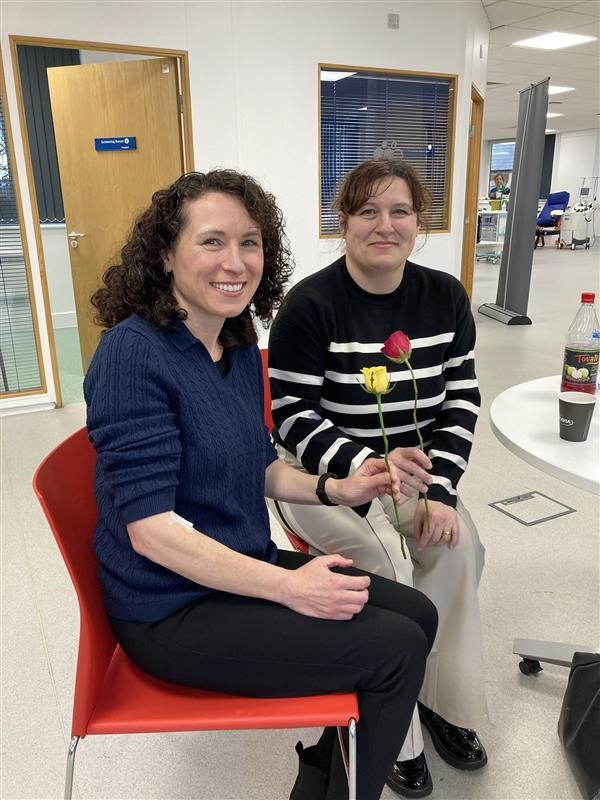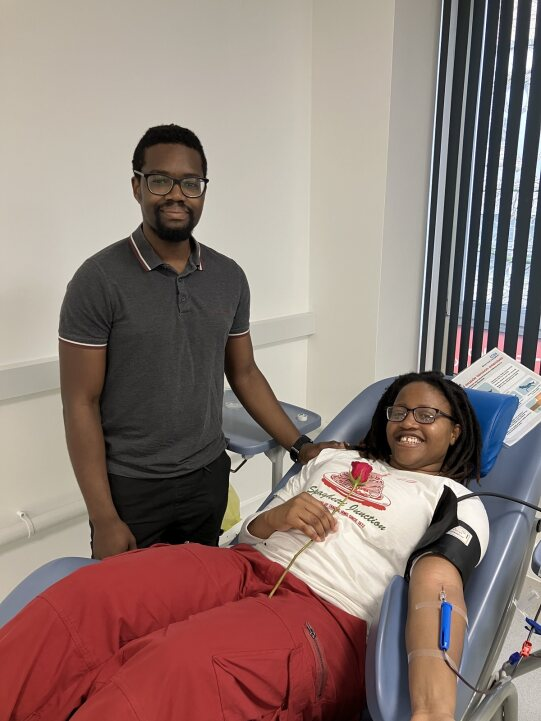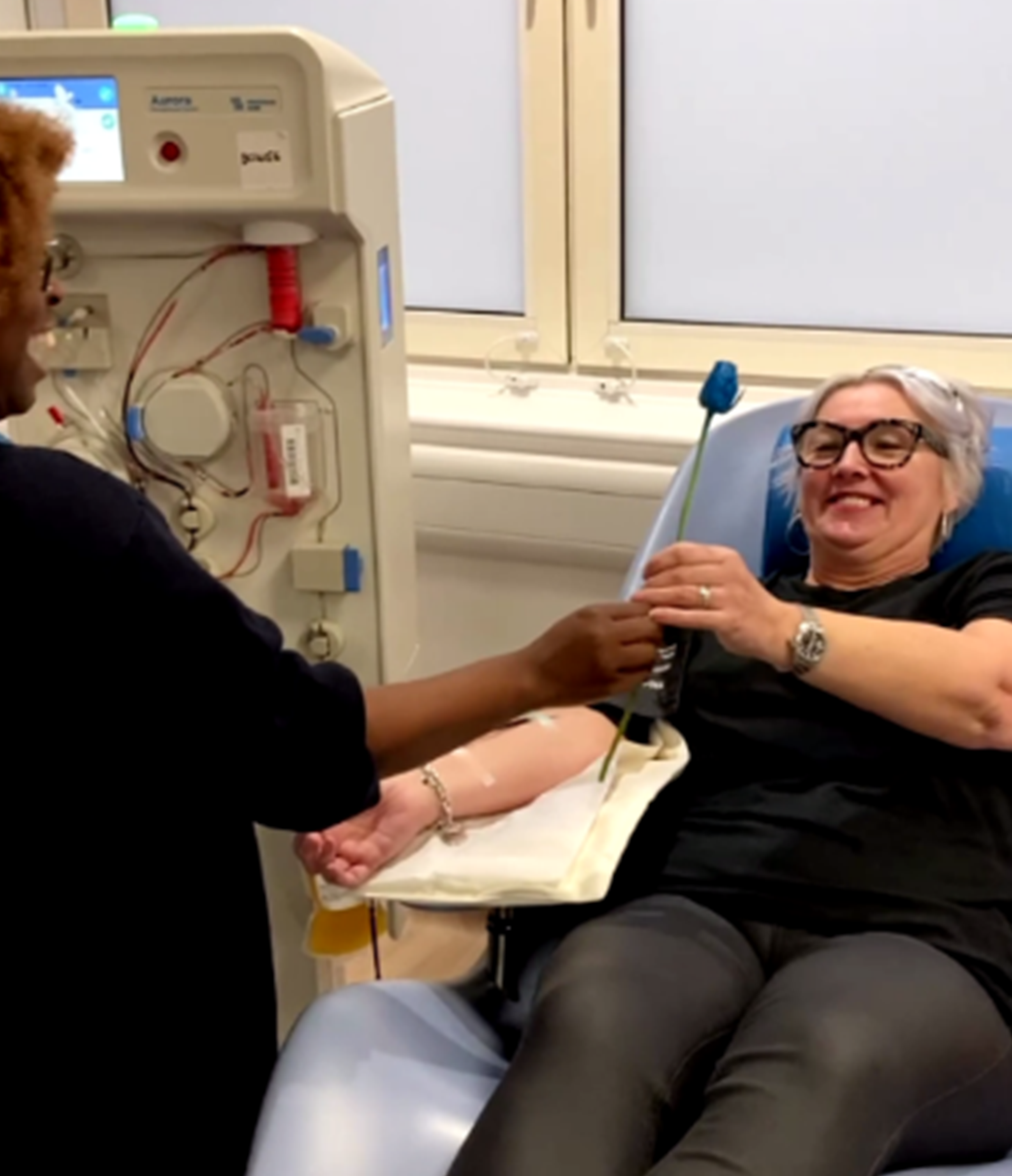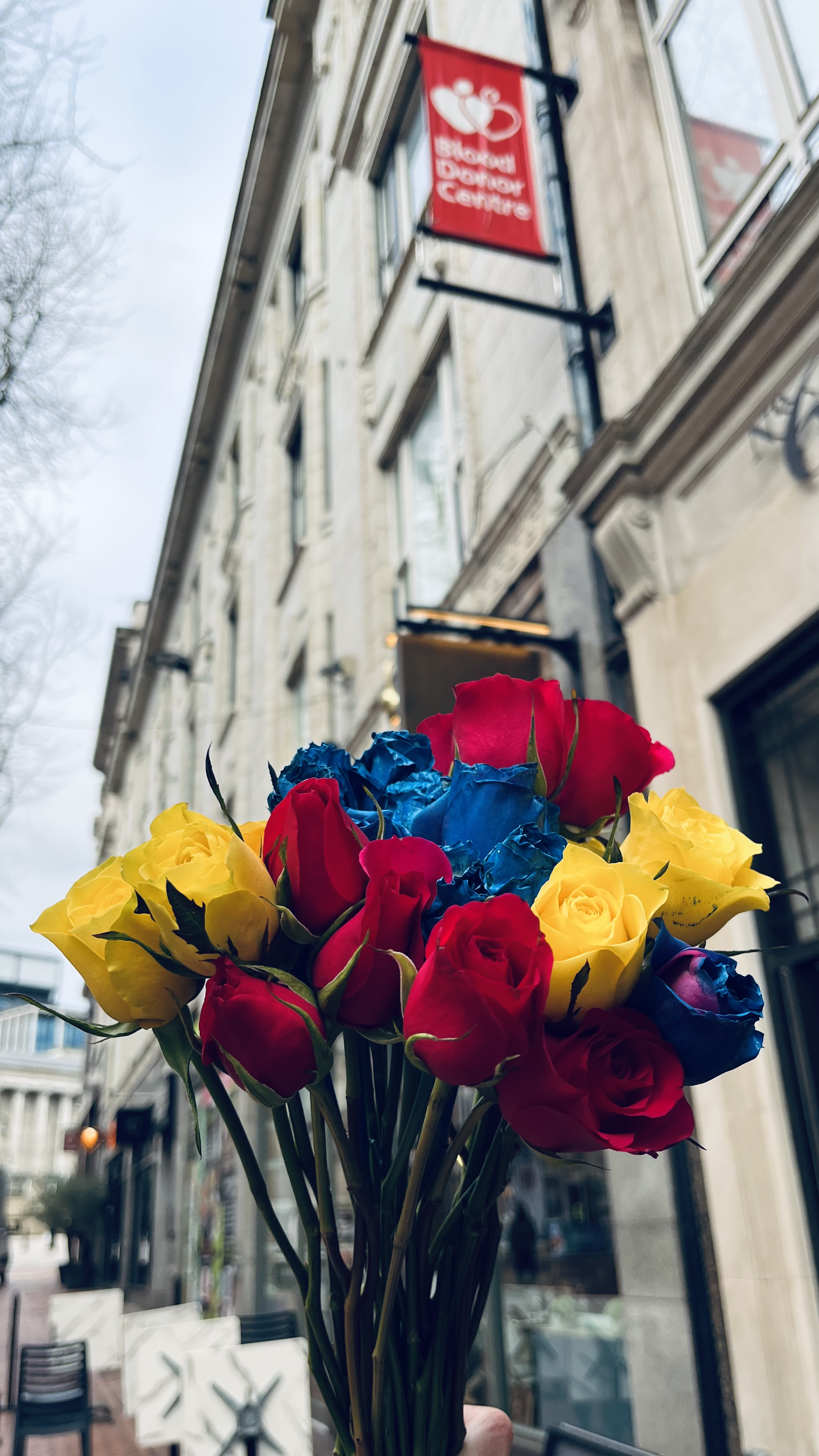Blood, plasma, and platelet donors in Birmingham surprised with roses for Valentine’s Day
 Sisters Debbie Willetts and Tracey Jackson from Dudley donated blood together in Birmingham. Their mother was diagnosed with leukaemia fifteen years ago and received platelet transfusions during treatment.
Sisters Debbie Willetts and Tracey Jackson from Dudley donated blood together in Birmingham. Their mother was diagnosed with leukaemia fifteen years ago and received platelet transfusions during treatment.
Although Debbie and Tracey couldn’t give platelets, they instead regularly give blood as their way of giving back for the platelet donations their mum received, marked by being given both a red and yellow rose.
Tracey said: “I was nervous when I gave blood for the first time, but it could not have been easier. The process is very streamlined and in less than an hour I know I have helped someone. It’s a great feeling! I especially like the follow up text that lets you know where your blood has been sent.”
Debbie said: “Since my first donation I’ve never looked back and it's become a part of my routine. Being a blood donor is a rewarding experience and you feel so proud after knowing you've done something important. Birmingham donor centre makes finding an appointment to meet your schedule so easy."
 It had been a year since 31-year-old Kanika Williams from Birmingham last gave blood and she was slightly nervous to get back into the chair, but boyfriend Idriss Assounanou was on hand to join her at the donor centre to provide some moral support and help her to relax during her donation.
It had been a year since 31-year-old Kanika Williams from Birmingham last gave blood and she was slightly nervous to get back into the chair, but boyfriend Idriss Assounanou was on hand to join her at the donor centre to provide some moral support and help her to relax during her donation.
Kanika said: “I decided to give blood because I could! Helping people is a very big part of who I am and I’m happy to donate a little bit of my time for a wide-reaching impact.”
Kanika was given a red rose as a gesture of thanks for her life-saving donation – each blood donation can help save or improve up to three lives.
 Clair Macdonald, Birmingham donor centre manager at NHS Blood and Transplant, said: “Birmingham donor centre is the only place in the country where the NHS collects all three components of blood from donors.
Clair Macdonald, Birmingham donor centre manager at NHS Blood and Transplant, said: “Birmingham donor centre is the only place in the country where the NHS collects all three components of blood from donors.
“Donors can either give whole blood, plasma, or platelets at the centre, and we recently opened a whole new floor dedicated to plasma collection.
“We’re conveniently located in the city centre on New Street and have a friendly team ready to welcome donors to our bright and modern space where they can access free WiFi and watch TV while they give blood, plasma, or platelets – and then enjoy a free post-donation snack!
“It was lovely to be able to thank some of our donors with a rose to thank them for giving up some of their time to do something amazing and help save lives.”
 Led by the NHS Blood and Transplant social media team, this initiative followed on from a call for more under-35s in Birmingham to give blood as the NHS recently revealed that more than half of blood donors in the West Midlands are now aged over 45.
Led by the NHS Blood and Transplant social media team, this initiative followed on from a call for more under-35s in Birmingham to give blood as the NHS recently revealed that more than half of blood donors in the West Midlands are now aged over 45.
Over-45s make up 52 percent of regular blood donors* in the region compared with 48 percent five years ago. Nationally, older people account for 51 percent of the donor population, having overtaken 17-44-year-olds this year for the first time since 2018.
Meanwhile, the proportion of the youngest donors has shrunk, with only half as many 17-24-year-olds in England giving blood now compared with five years ago**.
- Register as a blood donor and book your first appointment via the GiveBloodNHS app or at www.blood.co.uk. If you can’t find an appointment straight away please book for further in the future. Your blood will still help to save lives then.
- There are only three plasma donation centres in England, including Birmingham, so it’s very important that the NHS makes the city a hotspot for plasma donation. If you’re the giving type, search ‘donate plasma’ and register as a donor at www.blood.co.uk/plasma.
- To donate platelets, donors need to have given blood or platelets before and have A negative, A positive or AB negative blood. Donors must be aged between 17 and 70 and are able to regularly spare up to 2 hours to donate at least 4 times a year at a donor centre. Find out more about platelet donation at www.platelets.blood.co.uk.
ENDS
- Blood donation
- NHS Blood and Transplant needs to collect 1.45 million units of blood each year to meet the needs of patients across England.
- There are four main blood groups – O, A, B and AB. O negative (the universal blood group) and B negative are particularly vulnerable to shortfalls. So, we want people with those blood groups to donate as regularly as they can.
- The NHS needs up to 200,000 new blood donors each year to replace those who stop donating and to ensure we have the right mix of blood groups to match patient needs in the future.
- We urgently need more Black heritage donors as they are more likely to have the blood type needed to treat the increasing number of patients suffering from sickle cell disease.
- There is an urgent need for donors with Ro blood. Only 2% of our donors have Ro type blood. Collecting enough is a constant challenge. Ro is often used to save people with the rare blood disorder, sickle cell disease. Ro blood is ten times more common in black people than in white people.
- Plasma donation
- Plasma is part of your blood. It’s the liquid which carries everything around the body. When donated, it is a yellow colour. Plasma is rich in antibodies, which are part of your immune system, and other important proteins such as albumin.
- Donated plasma will be made into a medicine called immunoglobin, which is used to treat people with immune disorders. Immunoglobulin strengthens and stabilises the immune system. Around 15,000 people in England receive plasma each year.
- During donation, a machine gradually separates out 700mls of plasma from blood. Donation takes about 35 minutes and the whole visit – including questionnaires and snacks - takes around one hour.
- The NHS relied on imported immunoglobulin since 1998, as a vCJD precautionary measure. In 2021, the Government accepted independent expert advice that plasma from UK donors could again be used for immunoglobulin. Plasma donation for medicines restarted in April 2021.
- There are plasma donor centres in Reading, Twickenham, and Birmingham. Plasma can also be recovered from normal blood donations, to provide another source of supply.
- Platelet donation
- Platelets are gold-coloured cells which help blood to clot and one donation can help up to three adults or 12 children.
- Most donations help people with cancer who are undergoing chemotherapy to avoid blood-loss, but platelet transfusions also help people who’ve lost a lot of blood after an accident, organ transplant or surgery.
- Donors need to have given blood or platelets before and have A negative, A positive or AB negative blood.
- Donors must be aged between 17 and 70 and are able to regularly spare up to 2 hours to donate at least 4 times a year at a donor centre - if over 70 and have donated blood or platelets within the last two years, they are still eligible.
*In the year to end April 2023. A regular donor is an existing donor who has donated at least once in the previous 12 months.
**Nationally, 17-24-year-olds made up 7.2 percent of the donor base in 2022/23 and 13.07 percent in 2017/18.
Notes to editors
- For additional information please contact the NHSBT press office on 01923 367600 or pressoffice@nhsbt.nhs.uk
- Follow GiveBloodNHS on social media here:
- Twitter/X: https://twitter.com/GiveBloodNHS
- Facebook: https://www.facebook.com/givebloodnhs/
- Instagram: https://www.instagram.com/givebloodnhs/
- YouTube: https://www.youtube.com/@NHSGiveBlood
About NHS Blood and Transplant
- NHS Blood and Transplant is a joint England and Wales Special Health Authority. We provide the blood donation service for England and the organ donation service for the UK. We also provide donated tissues, stem cells and cord blood. We are an essential part of the NHS, saving and improving lives through public donation.
- It is quick and easy to book an appointment to give blood. Call 0300 123 23 23 or visit www.blood.co.uk
- NHSBT has 25 permanent donor centres in London (Tooting, Edgware, West End, Shepherd’s Bush and Stratford) Manchester (Plymouth Grove and Norfolk House), Cambridge, Luton, Nottingham, Sheffield, Leicester, Bradford, Leeds, Newcastle, Lancaster, Liverpool, Stoke, Birmingham, Bristol, Gloucester, Oxford, Southampton, Poole and Plymouth. Our mobile teams also collect blood at community venues such as church halls around the country.
